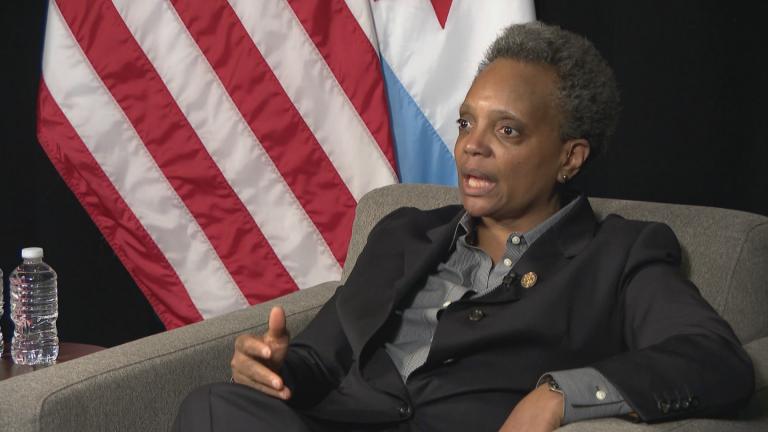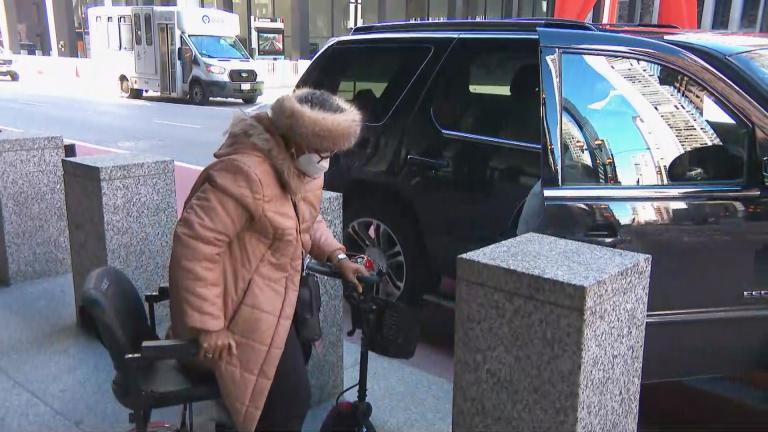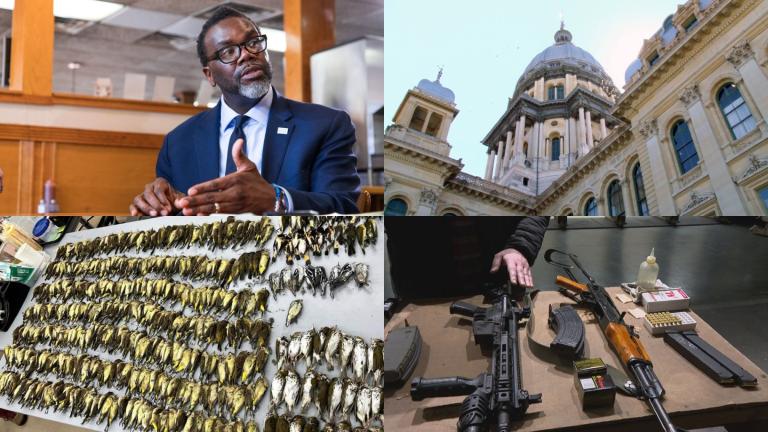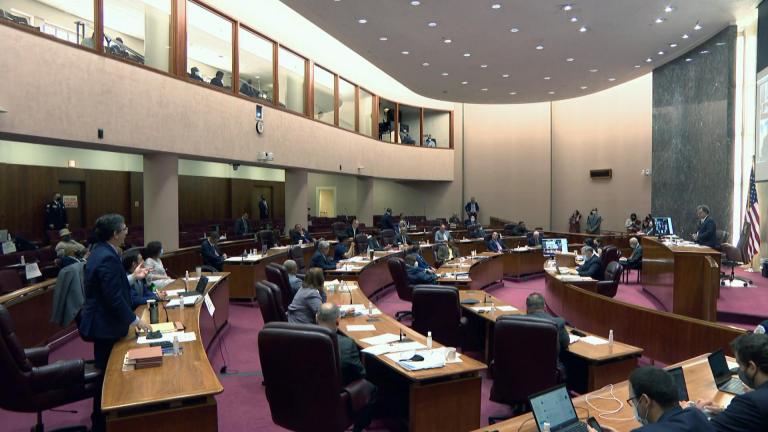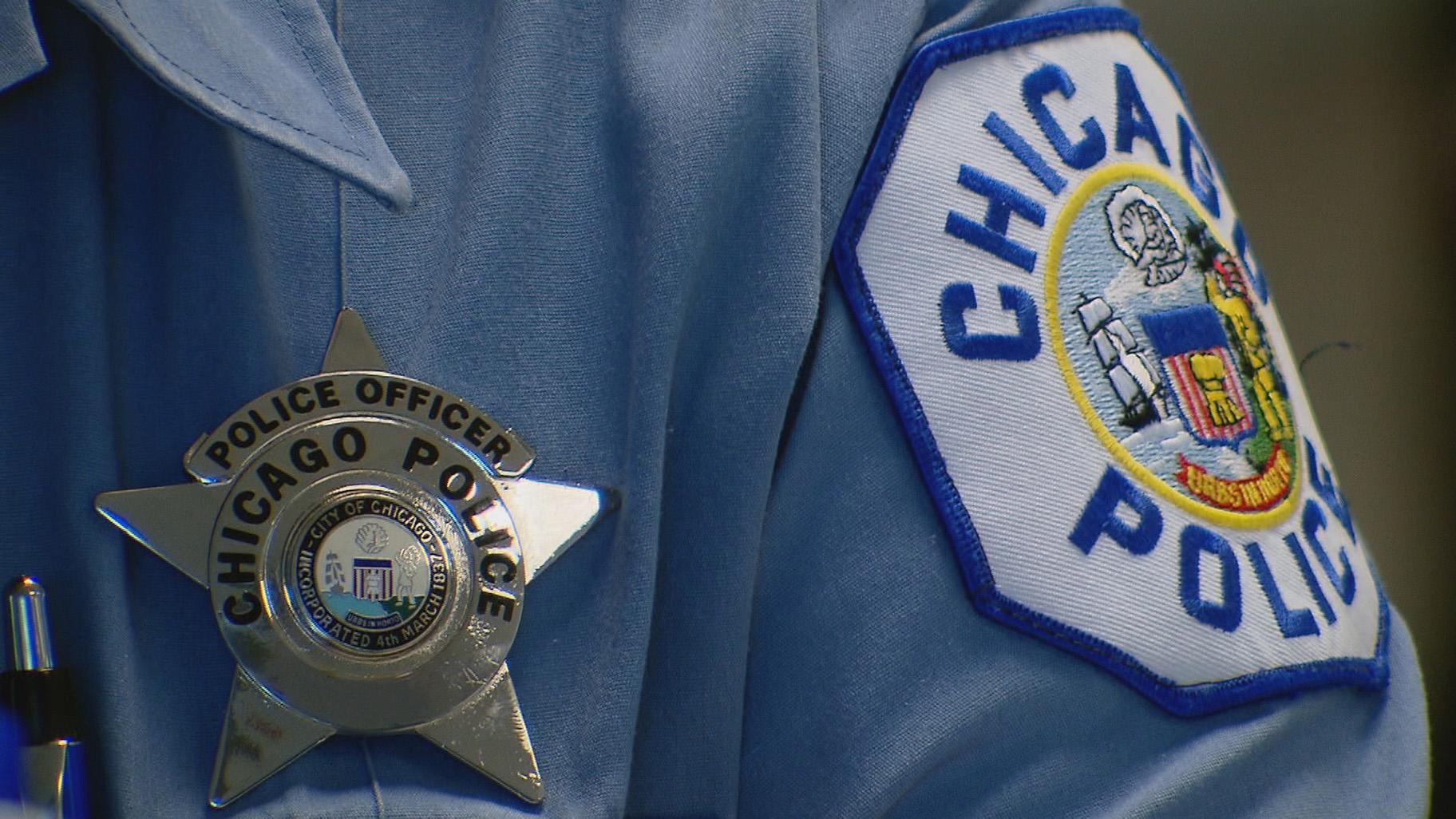 (WTTW News)
(WTTW News)
Mayor Lori Lightfoot on Monday proposed creating a seven-member civilian board to oversee the Chicago Police Department, but her plan would give the board’s elected members only the authority to advise the mayor.
That would keep the power to run the embattled police department concentrated in the mayor’s office even after decades of scandals, misconduct and brutality.
The board proposed by Lightfoot would only have the power to “assess the performance of and set goals for the superintendent, chief administrator and police board president” and provide input — but not the final say — on departmental policy.
“This proposal will significantly overhaul how the Chicago Police Department’s leadership and members are overseen, managed and held accountable when necessary,” Lightfoot said in a statement.
Lightfoot’s plan would give the elected board the power to conduct a search and recommend candidates to the mayor to pick as police superintendent. That power now resides in the appointed Police Board.
The elected board would also recommend — but not select — the chief administrator for the Civilian Office of Police Accountability, known as COPA, and members of the Police Board.
The board would also recommend the annual budget for the police department to the City Council.
The elected police oversight board, as proposed by Lightfoot, would have significantly less power than called for in her platform during the 2019 mayoral campaign. Lightfoot promised to sign the measure crafted by a coalition of community organizations under the umbrella of the Grassroots Association for Police Accountability, known as GAPA, within her first 100 days in office.
Lightfoot reversed course in March 2020 when GAPA supporters insisted that the elected board have the final say on police policies as well as the power to pick the chief administrator of the Civilian Office of Police Accountability, the agency charged with probing police misconduct.
However, ceding that kind of authority would make it impossible for the mayor to keep Chicago safe, Lightfoot said Monday at an unrelated event, adding that she “wears the jacket” for Chicago violence.
“Public safety is one of the most critical responsibilities of any mayor — me and anybody who will come” after she leaves office, Lightfoot said.
Lightfoot’s proposal comes eight months after she dropped her support of the proposal crafted by GAPA. That plan dates back to 2017, and emerged from the outcry following the police murder of Laquan McDonald after hundreds of community meetings.
An elected oversight board is the last major reform proposed — but not implemented — in the wake of the shooting death of 17-year-old McDonald.
Ald. Chris Taliaferro (29th Ward), the chairman of the City Council’s Public Safety Committee, endorsed the mayor’s plan.
“Once approved, police officers will now be answerable to the public who they are hired to protect and serve, and as a former police officer and lifelong resident, I am proud to know that Chicagoans from every walk of life will now have an equal opportunity to oversee their police,” Taliaferro said in a statement released by the mayor’s office.
The release of Lightfoot’s plan puts her on a collision course with all three of the major City Council caucuses, which have endorsed a compromise measure known as Empowering Communities for Public Safety, that was crafted after supporters of GAPA joined forces with the supporters of a competing proposal known as CPAC.
Taliaferro promised Friday to hold a vote on an elected oversight board in June.
The mayor’s office said Lightfoot’s plan “aims to draw from the most effective and workable aspects of those proposals, and aims to meet all three’s shared goal of reforming oversight of Chicago’s police, and in so doing to further empower the public to hold accountable their own law enforcement system.”
The Empowering Communities for Public Safety proposal would create a two-tiered system of accountability for police officers by focusing on each of the 22 police districts as well as citywide.
The elected board would have the power to hire and fire the head of COPA and would have the final say on policy disputes between the police department and its two oversight agencies: COPA and the Police Board, which disciplines officers. A two-thirds vote of the City Council could overturn a decision by the commission.
In addition, Lightfoot objects to giving the elected oversight board the power to trigger City Council hearings and action with a no-confidence vote in the superintendent, the president of the Police Board and the head of COPA.
CPAC would have given an elected board the power to hire and fire the superintendent. Lightfoot has rejected that proposal as too far-reaching and did so again on Monday.
“The relationship between the mayor and the police superintendent is critically important,” Lightfoot said. “So we have a process by which the candidates will be vetted through the commission. The commission will make recommendations. But yes, because the buck stops with me, I will ultimately, as mayor … be making that decision.”
A binding referendum, which could go to voters in 2022, could give the 11-member board the power to hire and fire the superintendent, negotiate contracts with the police department’s labor unions and set the Chicago Police Department’s budget. The mayor would appoint two members of the board if the referendum is approved.
Contact Heather Cherone: @HeatherCherone | (773) 569-1863 | [email protected]


